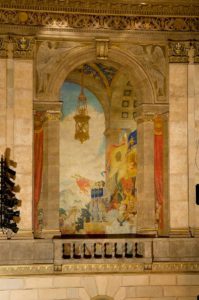A conversation with Steve Danyew ’10E (MM)
Alumnus talks about his musical career and delves into his inspiration for composing “Festival Music,” a fanfare written in honor of Eastman School of Music’s centennial
 Last year, Steve Danyew ’10E (MM) got an email from the Eastman School of Music inviting him and other alumni to compose short fanfare pieces to honor the school’s upcoming centennial celebration. Eastman selected Danyew’s piece, “Festival Music,” to help kick off its centennial year at a virtual event on Thursday, April 29 during which the school honored 100 years of music and announce details around its centennial fundraising campaign. Members of the Eastman Wind Ensemble, which is made up of undergraduate and graduate students, will perform Danyew’s piece.
Last year, Steve Danyew ’10E (MM) got an email from the Eastman School of Music inviting him and other alumni to compose short fanfare pieces to honor the school’s upcoming centennial celebration. Eastman selected Danyew’s piece, “Festival Music,” to help kick off its centennial year at a virtual event on Thursday, April 29 during which the school honored 100 years of music and announce details around its centennial fundraising campaign. Members of the Eastman Wind Ensemble, which is made up of undergraduate and graduate students, will perform Danyew’s piece.
What is a fanfare?
Fanfares have been played for centuries to announce and celebrate an important or special event. They are typically short and feature brass and percussion. Perhaps one of the most famous is “Fanfare for the Common Man,” with which many people are familiar.
What was your inspiration for this piece?
I wanted to write a fanfare that connected with the school’s history in some way. I started my research by going to the library—this was before the pandemic—and I checked out a few books including The Eastman Theatre: Fulfilling George Eastman’s Dream by Elizabeth Brayer. I found a few pages dedicated to the murals that decorate the inside of Eastman Theatre.
Those murals were the perfect inspiration—I knew I could compose something that wove together art with music and the history of the school. I studied the murals and was struck by a mountain scene that featured a number of musicians, including a few with trumpets playing what could very likely have been a fanfare. It looked like a celebratory musical moment, which was ideal to draw on for my piece as I wanted to honor Eastman’s history while looking toward the future. That mural by artist Ezra Winter, which has been part of the school since it’s opening, is titled “Festival Music.”
What influence has Eastman had on your life and career?
It goes back to high school for me. My band director, James Dumas ’92E, was an Eastman alumnus who often talked about his experience at the school. Eastman always had this mystique for me, and it was the natural choice for my master’s degree. Eastman is a very special community where you are surrounded by fantastic faculty and students who are all passionate about music.
The idea of Meliora—ever better—is so true here. You come to Eastman and are around this powerful energy that helps you be better musically and as a person—everyone is dedicated to elevating each other. I’ve met key people in my life here, too, including my wife, Ashley; Ray Ricker, the director at the Institute for Music Leadership, with whom I’ve cowritten, Lessons from a Streetwise Composer; and Mark Scatterday ’89E (DMA), the director of the Eastman Wind Ensemble. It’s an honor that this student group will perform my piece at Eastman’s centennial kickoff event.
What’s your book about?
As a student and now instructor at the Eastman’s Institute for Music Leadership, I’ve learned so much from Ray Ricker ’73E (DMA). He—along with so many other faculty—helped me think about myself not just as a musician but as someone running a business. He gave me practical skills and advice regarding how to navigate the professional music world, which is what this book is about. Even though a career in music can be challenging, so many musicians thrive in it. They develop an entrepreneurial mindset, learn how to separate themselves from the pack, and create and sustain professional networks—all while maintaining their artistic integrity.
What tips do you have for student musicians?
I tell students that a career in music is never a straight line. It always zig zags and you may end up where you don’t expect, which can be very rewarding. If you are savvy, curious, and determined, you can have a rewarding career. For instance, I actually never thought I’d be a teacher and a composer. I always thought I’d have a career in arts administration while composing, but over time, my composing career has become more successful, for which I am quite grateful. I sort of fell into teaching because of my relationship with Ray Ricker and the Institute for Music Leadership. And now, as a composer and an alum, it’s an honor to be part of the legacy and history and to contribute a fanfare that’s tied to Eastman’s historic centennial celebration.
What are you working on right now?
I’m composing a piece on climate change for string orchestra and percussion. Over the last few years, I’ve become interested in writing music that is connected with something else. For instance, “Festival Music” connects with Eastman Theatre’s murals and history. Instead of writing “just” a melody or harmony, I’ve been enjoying writing music that aligns with a poem, some text, or an issue, like climate change. I’m excited about the new piece and I hope it will prompt people to pause and think. As artists, that’s one thing we can do—create spaces for people to reflect on what’s beautiful, like a piece of art, or what’s meaningful, such as some of the issues we are all facing.
Learn more about Steve Danyew and his inspiration for “Festival Music” in this WXXI story and video:
For more on Steve Danyew, visit his website.
Learn more about the Eastman School of Music’s Centennial Campaign and help celebrate a century of artistry, scholarship, leadership, and community. Get involved, too—compose a fanfare, attend an event, tell us your story, and follow Eastman on social media.
— Kristine Thompson, April 2021

